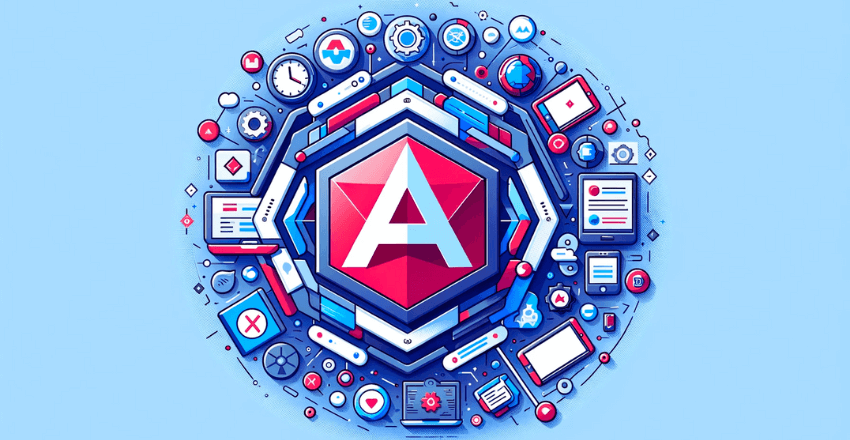 Is Angular Cross-Platform? Yes, it’s a highly adaptable framework for developing responsive and dynamic web applications that perform consistently across different devices and operating systems.
Is Angular Cross-Platform? Yes, it’s a highly adaptable framework for developing responsive and dynamic web applications that perform consistently across different devices and operating systems.
This is where cross-platform development comes in, and one of the frameworks that have gained popularity in recent years is Angular.
Key Takeaways
- Angular is a Javascript framework used in web and mobile app development.
- Angular is cross-platform compatible and supports multi-platform app development.
- Angular is suitable for front-end development and can be used with other frameworks.
Angular Framework: Enabling Cross-Platform Development
As the demand for mobile applications and native apps continues to grow, software development has transitioned to a multi-platform landscape. Cross-platform development has become a key requirement for developers, allowing them to create applications that can run natively on multiple platforms, without sacrificing functionality or performance. But what does cross-platform mean, and how can Angular help?
Cross-platform development refers to the process of building applications that can run on multiple platforms, such as desktops, tablets, and smartphones, with a single codebase. This allows developers to save time, effort, and cost, by avoiding the need to build separate applications for each platform. Cross-platform frameworks, such as Angular, enable developers to create these applications quickly and efficiently, through the use of shared code and resources.
Benefits of Cross-Platform Development

Cross-platform development offers numerous benefits for both developers and businesses. For developers, cross-platform development allows for faster and more efficient development, with a reduced need for specialized knowledge in different programming languages and platform-specific development frameworks. This translates to lower costs and shorter time-to-market.
For businesses, cross-platform development enables them to reach a wider audience, with applications that can run on different platforms, without the need for separate development efforts for each platform. This also allows for faster product iterations and updates, leading to increased customer satisfaction.
Angular for Cross-Platform Development
It is a powerful JavaScript framework, widely used in web development, and increasingly popular in mobile development as well. Angular offers numerous advantages for cross-platform development, including a modular architecture, a robust set of tools and features, and a large and active community of developers.
Angular’s modular architecture allows developers to break down applications into smaller, reusable components, enabling faster and more efficient development. Additionally, Angular’s rich set of tools and features, such as dependency injection, two-way data binding, and directives, enables developers to build complex and highly functional applications.
Angular also provides support for responsive design, enabling applications to adapt to different screen sizes and form factors, while maintaining a consistent user experience.
Compared to other cross-platform frameworks, Angular stands out for its ease of use, productivity, and versatility. Angular’s popularity and widespread use also mean that developers can find a wealth of resources, documentation, and community support, making it an ideal choice for cross-platform development.
Angular for Web and Mobile Applications

Angular is a versatile framework that enables developers to build efficient and responsive web and mobile applications. Its cross-platform compatibility makes it an ideal choice for creating apps that work seamlessly on different devices and platforms. In this section, we will explore the benefits of using Angular for cross-platform app development and examine the various applications of this framework in web and mobile development.
Angular for Web and Mobile
Angular is a widely adopted framework for building web and mobile applications. Its powerful features enable developers to create compelling user interfaces and responsive designs that work well across multiple platforms and devices. With Angular, developers can build single-page web applications and native mobile applications using the same codebase, saving time and effort in the development process.
Cross-Platform App Development with Angular
Angular supports cross-platform app development, making it an ideal choice for developers looking to create applications that run seamlessly on different devices and platforms. With Angular, developers can create apps that run on iOS, Android, and the web, using a single codebase. This significantly reduces development time and maximizes productivity.
Angular Framework for Cross-Platform Apps
Angular offers several advantages for cross-platform app development. Its modular architecture enables developers to build scalable and modular apps that can be easily extended and updated. Additionally, Angular provides developers with a range of tools and features to create intuitive and visually engaging user interfaces, including animations, directives, and components.
Angular Cross-Platform Compatibility
Angular supports cross-platform compatibility, allowing developers to create applications that work seamlessly on different platforms and devices. With Angular, developers can use a single codebase to build applications that work on iOS, Android, and the web. This minimizes the need for platform-specific code and reduces development costs.
Advantages of Angular for Cross-Platform

Angular offers several advantages for cross-platform app development, including faster development times, reduced development costs, and improved productivity. Additionally, Angular provides developers with a range of tools and features to create visually engaging user interfaces and responsive designs, making it an ideal choice for creating modern web and mobile applications.
Best Practices for Angular Cross-Platform Development
To maximize the potential of Angular for cross-platform development, it’s essential to follow best practices such as modular design, using services and dependency injection, and creating reusable components. Additionally, following good coding practices such as writing clean code and using version control can significantly enhance the reliability and maintainability of Angular applications.
Overall, Angular’s cross-platform development capabilities and the advantages it provides make it the best choice for developers seeking to create efficient and responsive applications that work seamlessly across different platforms and devices.
Conclusion
Angular is undoubtedly the best cross-platform framework suitable for both web and mobile applications. Through our exploration of Angular in this article, we have highlighted the benefits of using Angular for cross-platform development and discussed best practices for development using this framework.
Angular ensures seamless compatibility across different platforms, making it a versatile and efficient solution for developers. Whether it’s desktop or mobile, Angular supports multi-platform development, making it a top choice for developers who require a cross-platform solution.
At the heart of Angular’s cross-platform development capabilities are its robust features, including its ability to facilitate the development of native apps that run across different platforms. Angular’s responsive design ensures that applications built using this framework are optimized for all devices, regardless of the screen size and resolution.
External Resources
https://en.wikipedia.org/wiki/Cross-platform_software
FAQ

Is Angular cross-platform?
Yes, Angular is a cross-platform framework. It allows developers to build applications that can run on multiple platforms, including web browsers, desktops, and mobile devices.
What is cross-platform compatibility?
Cross-platform compatibility refers to the ability of software or applications to function consistently and seamlessly across different operating systems and devices. In the case of Angular, it enables developers to create applications that can run on various platforms without the need for extensive modifications or separate codebases.
How does Angular enable cross-platform development?
Angular provides features and tools that simplify the process of developing cross-platform applications. It offers a consistent and efficient development environment, reusable code components, and built-in support for responsive design, making it easier for developers to create applications that adapt to different screen sizes and resolutions.
What are the benefits of using Angular for cross-platform development?
Some advantages of using Angular for cross-platform development include increased productivity, code reuse, improved performance, and a seamless user experience across multiple devices. Angular’s extensive library of pre-built components and its focus on modular development also contribute to easier and faster cross-platform application development.
How does Angular compare to other cross-platform frameworks?
While there are other cross-platform frameworks available, Angular stands out for its robustness, community support, and extensive ecosystem. Its popularity among developers and its backing by Google make it a reliable choice for cross-platform development. Additionally, Angular’s integration with other Angular-related tools and libraries, such as Angular CLI and Angular Material, further enhance its capabilities.
Can I use Angular for web and mobile applications?
Yes, Angular can be used for both web and mobile applications. It provides the necessary tools and features to develop responsive and scalable applications that work well across different devices and platforms. Whether you’re building a website or a mobile app, Angular offers the flexibility and functionality needed for successful cross-platform development.
William is a highly accomplished technical author specializing in cross-platform app development. With a rich background in the tech industry, he has worked at prestigious companies like Uber and Facebook, where he honed his skills as an iOS developer since 2009. Throughout his career, William has been an advocate for leveraging frameworks like React Native and Xamarin to create innovative and efficient cross-platform mobile apps.
Having pursued a degree in Computer Science and Mathematics at Caltech, William is equipped with a strong educational foundation. Currently residing in LA with his two daughters, he finds solace in exploring the scenic hills through hiking. Passionate about knowledge sharing, William not only builds cutting-edge applications but also takes pleasure in teaching students how to develop their own cross-platform mobile apps. His expertise, combined with his dedication to empowering others, makes him an invaluable asset in the field of app development.







